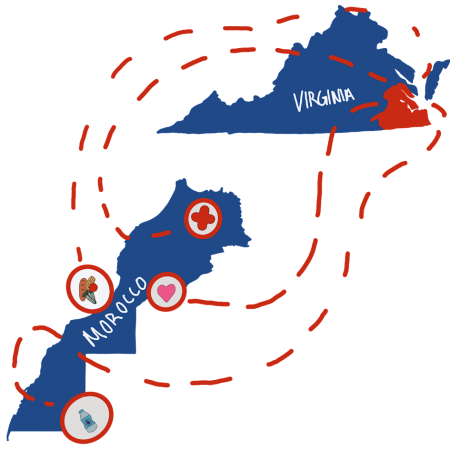Featured Image: Mars Johnson | Marlin Chronicle
A 6.8-magnitude earthquake hit Morocco on Sept. 8, the deadliest the region has faced since the 1960s. This earthquake has caused nearly 3,000 deaths, over 5,500 injuries and near unprecedented devastation. The earthquake managed to topple entire villages in seconds, leaving many without resources. Families are torn apart, farmlands are wiped out, schools, homes, places of worship and businesses are destroyed.
Tyler Noll, a sophomore currently studying abroad in Morocco, said, “The worst part is that the communities have to keep moving forward. They hardly have time to mourn as they have to figure out a place to live and where to get food.”
Noll stressed that the victims are not alone. “Thankfully,” Noll said, “these are the ones looked after most by the relief efforts.”
From the USA to the UAE, a variety of governments and humanitarian aid institutions have rushed to offer aid, manpower and money to Morocco to assist recovery efforts. Even Algeria, a nation with which Morocco has experienced years of hostile relations, has reached out a hand.
Aid was ready to be dispatched as soon as the Moroccan government approved it.
“Civil protection teams were prepared to support search and rescue efforts and ready on the airport tarmac waiting to depart, pending the green light from Morocco,” Political Assistant to the US Consulate in Algeria Souad Lehtihet said.
Lehtihet spoke more on Algeria’s decision to help.
“Whether on state or private media or on social media, Algerians were unanimous; ‘despite zero diplomatic ties between our two countries, we as Algerians have a moral obligation to help the Moroccans because they are brothers and neighbors,’” Lehtithet said. “Moreover, if you do not show mercy and compassion in times of hardships and calamities, when are you expected to show it? Mercy, or Rahma in Arabic, is paramount in our religion and culture.”
Government-led relief efforts could only stretch so far. The most catastrophic damage from the earthquake took place in mountainous regions, which are difficult to access, leaving survivors in these areas waiting days for official help. This is where privately-delivered and volunteer-led relief efforts are stepping in, a few of which are receiving significant help from right here in Norfolk.
Street Child, an international children’s charity started in Norfolk, utilized its connections to Moroccan non-governmental organizations (NGOs), which are independent institutions driven by social missions, to organize an emergency fund to send money towards “highly effective local organizations who are responding” in grief-stricken areas throughout the Maghreb. To raise money for this fund, schools throughout Norfolk have organized non-uniform days and churches have contributed through Sunday collections.
Other organizations, such as Operation Blessing, whom Virginia Wesleyan has worked closely with, have dispatched relief teams directly onto the ground to help in the hard-to-reach areas. Operation Blessing’s international relief team is currently working alongside local relief teams to provide food, clean water, blankets and even solar lights to help revive the area.
Norfolk business owners have been significantly contributing towards these efforts. Omar Boukhriss, owner of Omar’s Carriage House, has used his restaurant to provide funds and is even flying to Morocco with his wife to volunteer with relief teams.
Boukhriss grew up in Morocco, and much of his and his wife’s family still resides there. Although his family was lucky to escape any harm, he said he is heartbroken “for everybody who lost their lives and their loved ones.”
So far, Boukhriss has raised enough money to provide 200 mattresses and pillows, 400 pairs of shoes, 200 pounds of dry food and tents to use as temporary shelters and schools to those affected.
Although the world has rallied together to support those affected in Morocco, the utmost comfort has been found within their own communities. Youth-led Riffian groups are providing support for the Amazigh tribes within the underdeveloped Rif region, and have already provided essential aid in the villages of Talgjount, Timlit, Tibit and Igli.
Volunteers in the Moroccan Red Crescent, a non-governmental organization focused on humanitarian aid, have been working tirelessly to provide medical care. Additionally, for students in Morocco persevering through the tragedy and continuing with their university studies, teachers have been invaluable supporters.
Isabella Grosswiler, a sophomore studying in Morocco, admires the work being done to assist with recovery.
“The teachers are really doing a good job at being… sympathetic and checking in with students constantly while allowing for plenty of adaptability with everything going on,” Grossweiler said.
The devastation caused by this earthquake, however, is not all the Maghreb region is currently suffering through, and most of the aforementioned relief efforts have been forced to broaden their support efforts as the entire region scrambles to reconstruct after various tragedies.
“I think that the month of September will be remembered as a tragic moment for the whole Maghreb as we had, if I can say it: twin tragedies. The Moroccan earthquake was catastrophic, but the floods in Libya as well, with more than thousands of deaths, plunged the whole region into grief. The human losses in Morocco and in Libya are enormous, and both countries are still deeply mourning,” Lehtihet said.
“For us in the Maghreb, Daniel, the deadly storm, and the earthquake opened our eyes and awareness on the emergency of dealing with climate change. It just showed how much the region is vulnerable,” Lehtihet said.
By Avery Belisle

